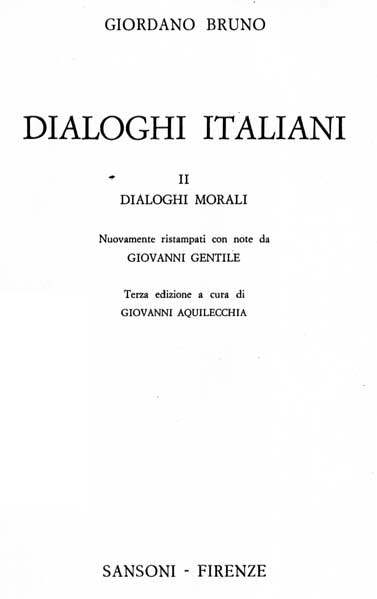Spaccio de la bestia trionfante proposto da Giove, effettuato dal Conseglio, revelato da Mercurio, recitato da Sofia, udito da Saulino, registrato dal Nolano; diviso in tre dialogi, subdivisi in tre parti; consecrato al molto illustre ed eccellente cavalliero Sig. Filippo Sidneo, stampato in Parigi, M.D.LXXXIIII, in Giordano Bruno, Dialoghi italiani, II, Dialoghi morali, nuovamente ristampati con note da Giovanni Gentile, terza edizione a cura di Giovanni Aquilecchia, Sansoni, Firenze, 1958, pp. 549-831.
The dialogue Spaccio de la bestia trionfante, which has been published in London in 1584 and draws inspiration from the satyrical genre of Lucian’s dialogues, is the first of the so-called Brunian moral dialogues. In this work, dedicated to the man of letters Philip Sidney, Bruno comes to reconsider the moral order on the basis of an anthropology which in its turn bears in mind the theoretical acquisitions of the natural philosophy proposed in the dialogues La cena de le Ceneri, De la causa, principio et uno and De l’infinito, universo e mondi. The new infinitist cosmology puts both the geocentrism and the anthropological view of nature in a critical condition. The Spaccio deals with themes of moral philosophy from an a-theological and also anti-theological point of view. It is in fact Bruno’s intention to develop a moral philosophy which tends, despite its all its problems, towards an autonomy from the Christian tradition and its values. To this end, Bruno refers to the Graeco-Roman world, examining virtues and vices. The work has a mythological setting. The Gods sit in judgement for to decide which of the sidereal constellations – representing vices and virtues – should be confirmed or expelled from the reformed moral heavens. Bruno specifies that Jove “represents each one of us” (“rapresenta ciascuno di noi”); as the governor of the Olympus he embodies the intellectual light which leads the moral reform.
Click here to go directly to the text
Editor's Note
The “errori più fastidiosi” (p. 830-831) have not been considered, because they refer to the original edition and have already been taken into account by the adopted edition.
|
|
The Spaccio de la bestia trionfante is an allegory treating above all of moral philosophy: the gods are represented as determining to expel from the heavens the constellations, which represented the vices. In their places are set the moral virtues.
